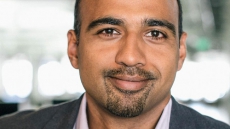Engineers, one of them of Indian origin, have successfully developed a single-chip microprocessor - a landmark development that opens the door to ultrafast, low-power data crunching.
The researchers packed two processor cores with more than 70 million transistors and 850 photonic components onto a 3-by-6-millimetre chip.
They fabricated the microprocessor in a foundry that mass-produces high-performance computer chips, proving that their design can be easily and quickly scaled up for commercial production.
The new chip marks the next step in the evolution of fiber optic communication technology by integrating into a microprocessor the photonic interconnects, or inputs and outputs (I/O), needed to talk to other chips.
“This is a milestone. It's the first processor that can use light to communicate with the external world,” said Vladimir Stojanovic, associate professor of electrical engineering and computer sciences at University of California-Berkeley.
No other processor has the photonic I/O in the chip.
Stojanovic and fellow UC Berkeley professor Krste Asanovic teamed up with Rajeev Ram at the Massachusetts Institute of Technology and Milos Popovi? at the University of Colorado, Boulder, to develop the new microprocessor.
“This is the first time we've put a system together at such scale, and have it actually do something useful, like run a programme," added Asanovic.
The team found the chip had a bandwidth density of 300 gigabits per second per square millimeter, about 10 to 50 times greater than packaged electrical-only microprocessors currently on the market.
The photonic I/O on the chip is also energy-efficient.
The achievement opens the door to a new era of bandwidth-hungry applications.
One near-term application for this technology is to make data centres more green.
According to the US Natural Resources Defense Council, data centres consumed about 91 billion kilowatt-hours of electricity in 2013 - about two percent of the total electricity consumed in the US.
The paper was published in the journal Nature.




